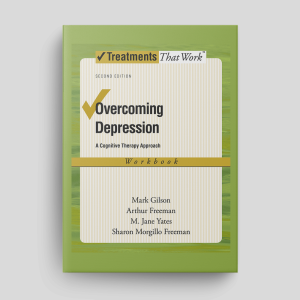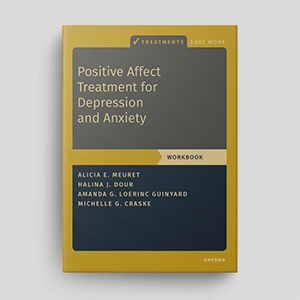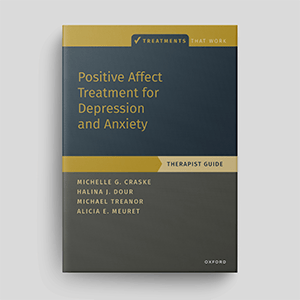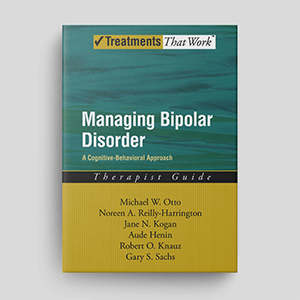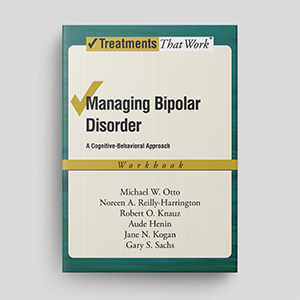Overcoming Depression (Second Edition): Therapist Guide
Overcoming Depression provides a structured, evidence-based approach to treating depression. Based on cognitive behavioral therapy (CBT), this workbook helps clients understand, manage, and overcome depressive symptoms. A therapist guide is downloadable separately.
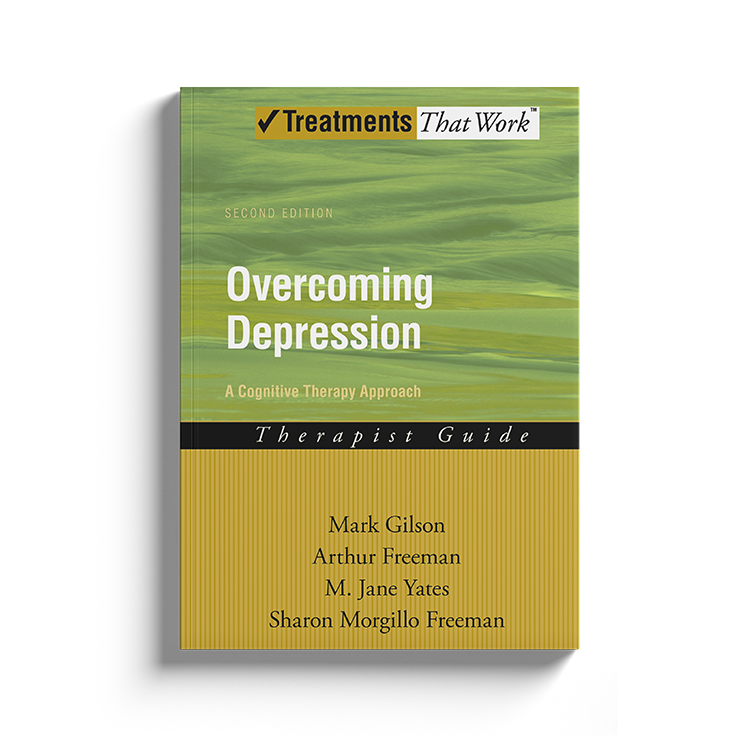
Download or send
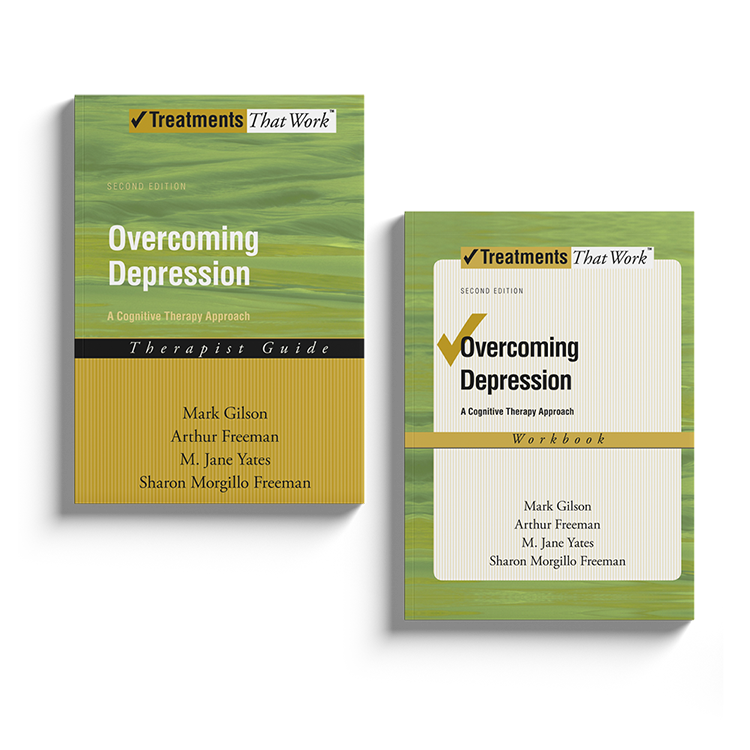
Overview
Cognitive behavioral therapy (CBT) is an effective treatment for depression. It is recommended by the American Psychiatric Association (APA) and the UK National Institute for Health and Care Excellence (NICE). Overcoming Depression – A Cognitive Therapy Approach (Second Edition) is written by Mark Gilson, Arthur Freeman, M. Jane Yates, and Sharon Morgillo Freeman. Built on decades of empirical research, this program provides therapists with all the tools they need to deliver effective, evidence-based psychological treatment for depression. Part of the Treatments That Work™ series, it provides step-by-step instructions for helping clients develop coping strategies and skills for proactively managing their depressed mood.
Why use this resource?
This workbook is designed to enhance cognitive therapy interventions by providing hands-on exercises that clients can complete between sessions. It:
- Reinforces CBT principles through structured, interactive activities.
- Encourages self-reflection and accountability in managing depression.
- Helps clients build coping skills that promote long-term recovery.
- Offers psychoeducation on depression and evidence-based treatment strategies.
- Supports therapist-client collaboration in goal setting and treatment planning.
Key benefits
Structured
Educational
Effective
Trusted
What difficulties is this for?
Major Depressive Disorder
Providing structured interventions for acute and recurrent episodes.
Persistent Depressive Disorder (Dysthymia)
Helping clients with chronic low mood develop effective coping strategies.
Bipolar Depression
Supporting individuals in managing depressive episodes within bipolar disorder.
Postpartum Depression
Assisting new parents in navigating mood-related challenges.
Seasonal Affective Disorder (SAD)
Offering behavioral and cognitive strategies to counter seasonal mood fluctuations.
Integrating it into your practice
Assessment
Explore how clients experience depression.
Psychoeducation
Teach clients about depression and what maintains it.
Skills
Implement effective cognitive-behavioral interventions to address key symptoms.
Monitoring
Use structured worksheets to track progress and refine interventions.
Relapse Prevention
Equip clients with long-term strategies for maintaining their progress.
Theoretical background and therapist guidance
The Overcoming Depression program is grounded in the cognitive therapy model originally developed by Aaron T. Beck. Depression is understood as a disorder maintained by patterns of negative automatic thoughts, distorted cognitive appraisals, and maladaptive underlying beliefs (Beck et al., 1979). The program introduces the metaphor of the “BEAST” to represent five key domains – Behavior, Emotions, Activities, Situations, and Thoughts – that interact to sustain depressive symptoms. By personifying depression, the BEAST model helps patients externalize the problem and target its components in therapy. This structured and accessible metaphor supports therapeutic engagement and fosters a sense of agency over the experience of depression (Gilson et al., 2009).
The cognitive behavioral therapy (CBT) approach underpinning the program is collaborative, structured, and multimodal. It emphasizes the therapist’s active role in assessment, formulation, and intervention, while guiding the patient toward increasing autonomy. Treatment is designed to be practical and present-focused, addressing how past learning and core beliefs affect current functioning. A distinguishing feature of the program is its integration of psychoeducation and skill-building, delivered through structured exercises and homework tasks that support the generalization of learning beyond the therapy session (Gilson et al., 2009). The program also incorporates a relapse prevention framework, equipping clients with strategies to maintain gains and manage future setbacks.
The effectiveness of CBT for depression is well supported by empirical research. Meta-analyses have consistently shown that CBT leads to significant improvements in depressive symptoms and is at least as effective as pharmacological treatments in many cases (Butler et al., 2006; Dobson, 1989). Moreover, studies suggest that CBT may be more effective in preventing relapse compared to medication alone (Dobson et al., 2008; Segal et al., 2006). These findings have led to CBT being recommended as a first-line treatment for depression by major clinical guidelines in both the UK and the US. The Overcoming Depression program builds on this robust evidence base, offering a practical, theory-driven resource that helps therapists implement effective interventions for a wide range of depressive presentations.
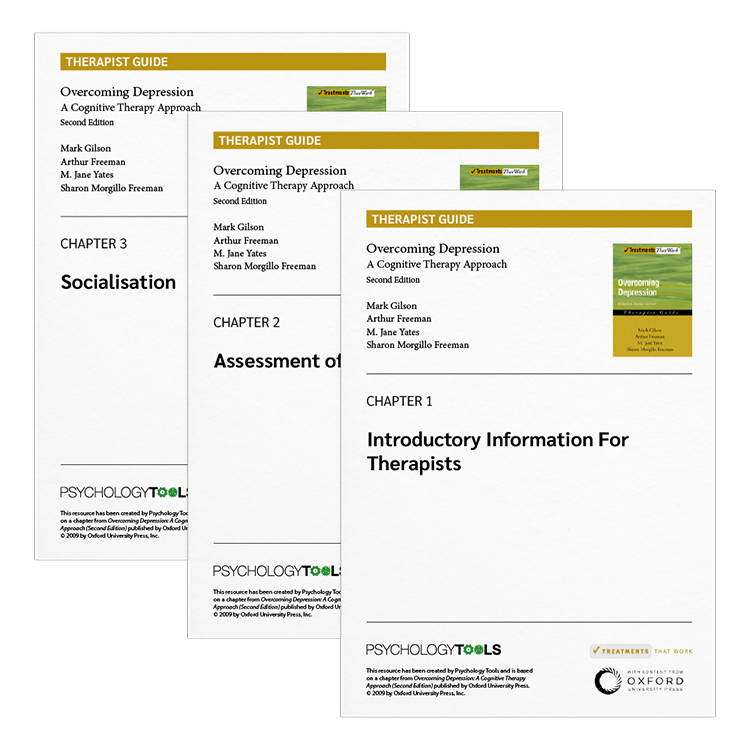
What's inside
- Psychoeducation on depression and cognitive therapy principles.
- Structured worksheets for cognitive restructuring, behavioral activation, and emotion regulation.
- Guided self-assessment tools for tracking mood and progress.
- Relapse prevention strategies to maintain long-term recovery.
- Exercises for in-session and at-home practice.
FAQs
How this resource helps improve clinical outcomes
Therapists utilizing this workbook can expect to see:
- Increased client engagement in therapy through structured activities.
- Greater adherence to cognitive therapy principles and strategies.
- Enhanced ability for clients to recognize and challenge depressive thought patterns.
- Improved behavioral activation and mood regulation.
- Reduced likelihood of relapse through structured relapse prevention planning.
Clients benefit from:
- A clear, structured approach to managing depressive symptoms.
- Practical tools for identifying and modifying negative thought patterns.
- Greater confidence in applying cognitive therapy skills in real-world situations.
- Increased resilience and improved emotional well-being.
Clinicians who use this resource also use
References and further reading
- American Psychological Association. (2019). Clinical practice guideline for the treatment of depression across three age cohorts: American Psychological Association guideline development panel for the treatment of depressive disorders. Retrieved from: https://www.apa.org/depression-guideline/guideline.pdf
- Beck, A. T., Rush, A. J., Shaw, B. F., & Emery, G. (1979). Cognitive Therapy of Depression. Guilford Press.
- Butler, A. C., Chapman, J. E., Forman, E. M., & Beck, A. T. (2006). The empirical status of cognitive-behavioral therapy: A review of meta-analyses. Clinical Psychology Review, 26(1), 17-31.
- Cuijpers, P. (2017). Four decades of outcome research on psychotherapies for adult depression: An overview of a series of meta-analyses. Canadian Psychology / Psychologie Canadienne, 58, 7-19. https://doi.org/10.1037/cap0000096
- Cuijpers, P., Noma, H., Karyotaki, E., Cipriani, A., & Furukawa, T. A. (2019). Effectiveness and acceptability of cognitive behavior therapy delivery formats in adults with depression: A network meta-analysis. JAMA Psychiatry, 76, 700-707. https://doi.org/10.1001/jamapsychiatry.2019.0268
- Dobson, K. S. (1989). A meta-analysis of the efficacy of cognitive therapy for depression. Journal of Consulting and Clinical Psychology, 57(3), 414-419.
- Dobson, K. S., Hollon, S. D., Dimidjian, S., Schmaling, K. B., Kohlenberg, R. J., Gallop, R. J., ... & Jacobson, N. S. (2008). Randomized trial of behavioral activation, cognitive therapy, and antidepressant medication in the prevention of relapse and recurrence in major depression. Journal of Consulting and Clinical Psychology, 76(3), 468-477.
- Gilson, M., Freeman, A., Yates, M. J., & Morgillo Freeman, S. (2009). Overcoming Depression: A Cognitive Therapy Approach (Second Edition). Oxford University Press.
- Kessler, R. C., McGonagle, K. A., Zhao, S., Nelson, C. B., Hughes, M., Eshleman, S., ... & Kendler, K. S. (1994). Lifetime and 12-month prevalence of DSM-III-R psychiatric disorders in the United States: Results from the National Comorbidity Survey. Archives of General Psychiatry, 51, 8-19. https://doi.org/10.1001/archpsyc.1994.03950010008002
- Lim, G. Y., Tam, W. W., Lu, Y., Ho, C. S., Zhang, M. W., & Ho, R. C. (2018). Prevalence of depression in the community from 30 countries between 1994 and 2014. Scientific Reports, 8, 1-10. https://doi.org/10.1038/s41598-018-21243-x
- National Institute for Health and Care Excellence. (2022). Depression in adults: Treatment and management (NICE guideline NG222). Retrieved from: https://www.nice.org.uk/guidance/ng222
- Segal, Z. V., Bieling, P., Young, T., MacQueen, G., Cooke, R., Martin, L., ... & Levitan, R. D. (2006). Antidepressant monotherapy vs sequential pharmacotherapy and mindfulness-based cognitive therapy, or placebo, for relapse prophylaxis in recurrent depression. Archives of General Psychiatry, 63(11), 1256-1264.
Just enter your name and email address, and we'll send you Overcoming Depression (Second Edition): Therapist Guide (English US) straight to your inbox. You'll also receive occasional product update emails wth evidence-based tools, clinical resources, and the latest psychological research.
Product
Company
Support
- © 2026 Psychology Tools. All rights reserved
- Terms & Conditions
- Privacy Policy
- Cookies Policy
- Disclaimer
Working...
We value your privacy
This site uses strictly necessary cookies to function. We do not use cookies for analytics, marketing, or tracking purposes. By clicking “OK”, you agree to the use of these essential cookies. Read our Cookie Policy
